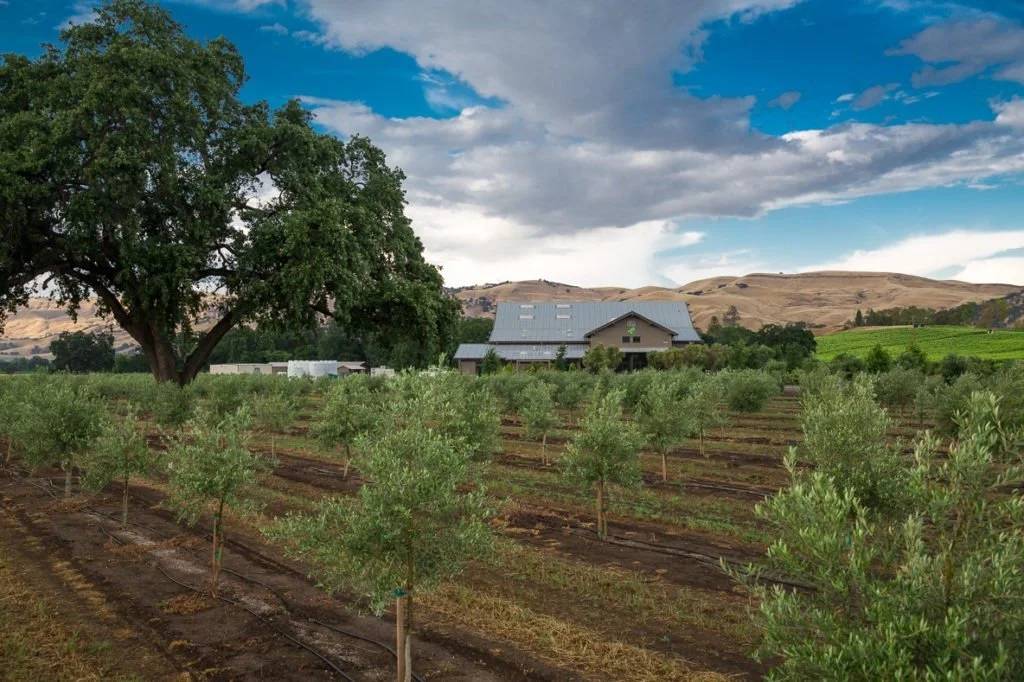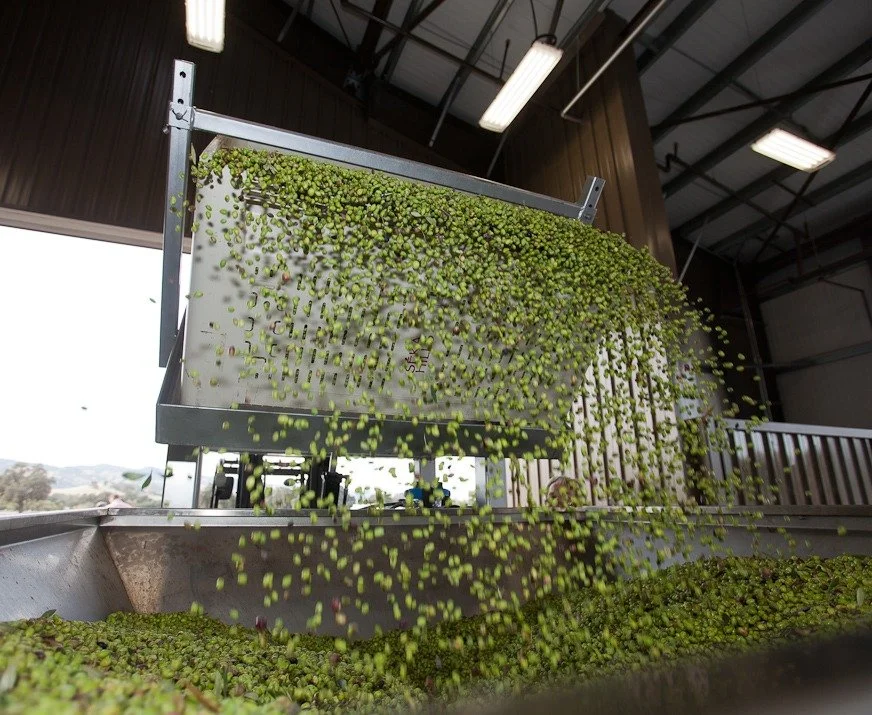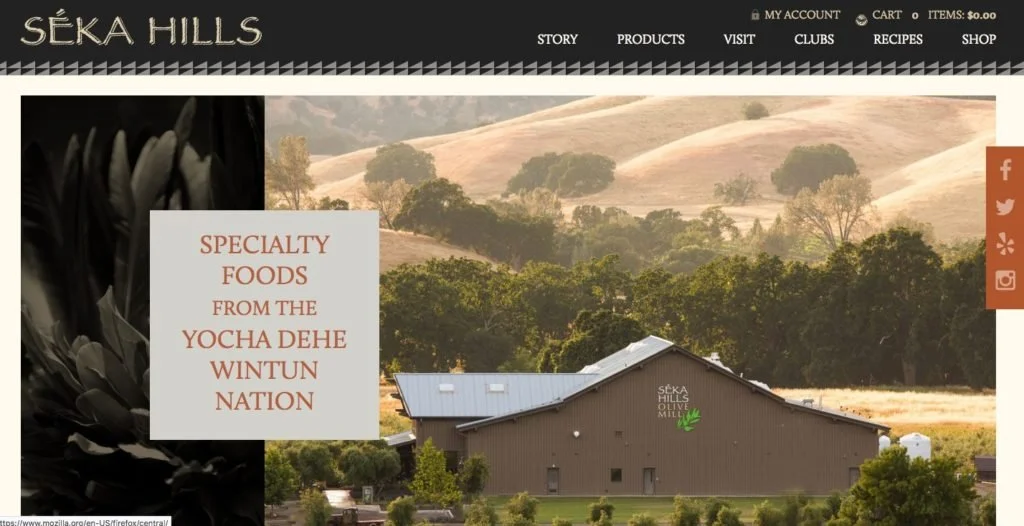 Breaking into Distribution and Agri-Tourism The Séka Hills Olive Mill debuted with the 2012 harvest. Olives are grown within a few miles of the 13,400-square-foot mill, which presses all Séka Hills’ olives, and also provides local milling for neighboring Yolo County and regional olive growers.Shortly after the first production, Etters and his assistant began knocking on doors to get placements on store shelves. “Our focus was on local, independent food stores and the higher end chains in the San Francisco Bay area. In the first six months, we got about 40 retail placements for the oil,” Etters said.That caught the attention of a specialty food distributor in San Francisco: ItalFoods. “It kind of exploded from there, and we built a very good relationship with Ital. They distribute throughout the Bay Area, Northern California and Sacramento,” Etters said.In 2014, the tribe started construction on its first multi-use Tasting Room inside the mill facility, opening the doors in 2015. That was the catalyst for tribal agri-tourism in the Capay Valley. A satellite tasting room at the Old Sugar Mill in Clarksburg opened in June 2017.
Breaking into Distribution and Agri-Tourism The Séka Hills Olive Mill debuted with the 2012 harvest. Olives are grown within a few miles of the 13,400-square-foot mill, which presses all Séka Hills’ olives, and also provides local milling for neighboring Yolo County and regional olive growers.Shortly after the first production, Etters and his assistant began knocking on doors to get placements on store shelves. “Our focus was on local, independent food stores and the higher end chains in the San Francisco Bay area. In the first six months, we got about 40 retail placements for the oil,” Etters said.That caught the attention of a specialty food distributor in San Francisco: ItalFoods. “It kind of exploded from there, and we built a very good relationship with Ital. They distribute throughout the Bay Area, Northern California and Sacramento,” Etters said.In 2014, the tribe started construction on its first multi-use Tasting Room inside the mill facility, opening the doors in 2015. That was the catalyst for tribal agri-tourism in the Capay Valley. A satellite tasting room at the Old Sugar Mill in Clarksburg opened in June 2017.
“For a small to mid-size specialty foods producer, direct-to-consumer sales are vital,” Etters said. “Operating the two tasting rooms—one in Brooks and one in Clarksburg—gives us the opportunity to showcase our products and sell our products at a better margin.”
Agri-tourism created the opportunity for the tribe to share its unique story—including its rich history, connection with the land, and sustainable agriculture initiatives.While olive oil anchors the Séka Hills product line, the brand offers an entire line of premium agricultural products produced from the tribe’s homeland. Other tribal products include Séka Hills Wildflower Honey, beef jerky, seasoned nuts, hummus, and pickled asparagus.“Our produce program is all organic. We grow organic asparagus, tomatoes, squash and wheat,” Etters said. Séka Hills partnered with Capay Organic to take its organic crops to market.
“Everything we do—except for the balsamic vinegar—is estate grown. There aren’t many specialty food producers that are all estate grown,” Etters explained. “We grow our own garbanzo beans and oil for our hummus; we produce our own asparagus for our pickled asparagus. That’s an important part of our story, and people appreciate that. They can tour our farm and see exactly where the olives are grown, and walk into the tasting room and see exactly how the olives are processed. They know exactly where their food is coming from,” Etters added.
That commitment to quality is the common thread throughout the Séka Hills line. When it comes to certified “extra virgin olive oil,” Séka Hills’ quality and transparency sets it apart from competitors in an international market largely diluted by false claims and corruption.“Once you taste a true extra-virgin olive oil you will never go back to what you were using before. You know exactly what you’re getting in a bottle of Séka Hills Olive Oil. You can see the trees; you can see the fruit growing; and you can see it going through the milling process,” Etters said.The tribe additionally formed the Séka Hills Club to market its wide array of agricultural products under the Séka Hills brand to regional consumers. Séka Hills Club membership has increased dramatically over the past year, and Etters anticipates that will continue. He describes the Séka Hills Club as different than a typical wine or olive oil club, because of its breadth and diversity. “We produce such a diverse lineup of products—from our honey to wine and olive oil to beef sticks and beef jerky to hummus. It was really about tribal products from the tribal homelands,” Etters said.Among its other agricultural initiatives, Yocha Dehe Ranch, the tribe’s sustainable grazing program and commercial cattle operation, counts 700 head of cattle. “The majority of our steers are sold on the conventional market, but we do harvest quite a few for own Séka Hills beef sticks and beef jerky,” Etters noted.Recently, the tribe launched its Séka Hills Beef Club. “We already have a waiting list,” Etters said. “We offer prime cuts once a quarter to our club members. We see that as a great opportunity to go direct with our beef.”Wine also rounds out the Séka Hills line. The tribe’s first wine, the 2010 Viognier wine, received high accolades and continues to do so with each vintage. “Ours wines continue to gain recognition through awards and social media. We’ve also expanded our offerings. We just released a Syrah and a Tanat—red grape varietals that thrive in the hot Capay Valley,” Etters said. Expanding its Reach After securing a local consumer base for its olive oil, particularly in Sacramento and the Bay Area, the tribe turned to the Pacific Northwest, namely Portland and Seattle. “It didn’t take us long to gain distribution in those markets. Traction continues to grow,” Etters said.Today the highly acclaimed Séka Hills extra virgin olive oils can be found in over 700 retail stores and restaurants across much of the United States and in Japan.Most recently, Séka Hills secured distribution in the Southwest—namely in Phoenix and Colorado. Over the next few years, Séka Hills intends to expand its wholesale distribution further east.“Beyond California, in the upper Midwest, the Southeast, and even into Texas, we’re seeing more demand for good quality oil from consumers and chefs as well. I think that trend is going to continue,” Etters said.Séka Hills also plans to plant an additional 35 acres of olive trees in spring. “We’re prepping the ground now for the planting of 35 acres of Coratina olives, which are very robust, bitter and pungent. I think that—like wine—the consumer is going to seek out different varietals and flavor profiles,” Etters predicted.In terms of direct-to-consumer sales, Séka Hills is focused on growing its club membership, and the company is always pursuing more retail locations.“We’ve built a really good model for our tasting rooms and brick-and-mortar sales. We want to duplicate that in other markets,” Etters said, “where consumers appreciate high quality food and are willing to pay a little extra for it.”
Expanding its Reach After securing a local consumer base for its olive oil, particularly in Sacramento and the Bay Area, the tribe turned to the Pacific Northwest, namely Portland and Seattle. “It didn’t take us long to gain distribution in those markets. Traction continues to grow,” Etters said.Today the highly acclaimed Séka Hills extra virgin olive oils can be found in over 700 retail stores and restaurants across much of the United States and in Japan.Most recently, Séka Hills secured distribution in the Southwest—namely in Phoenix and Colorado. Over the next few years, Séka Hills intends to expand its wholesale distribution further east.“Beyond California, in the upper Midwest, the Southeast, and even into Texas, we’re seeing more demand for good quality oil from consumers and chefs as well. I think that trend is going to continue,” Etters said.Séka Hills also plans to plant an additional 35 acres of olive trees in spring. “We’re prepping the ground now for the planting of 35 acres of Coratina olives, which are very robust, bitter and pungent. I think that—like wine—the consumer is going to seek out different varietals and flavor profiles,” Etters predicted.In terms of direct-to-consumer sales, Séka Hills is focused on growing its club membership, and the company is always pursuing more retail locations.“We’ve built a really good model for our tasting rooms and brick-and-mortar sales. We want to duplicate that in other markets,” Etters said, “where consumers appreciate high quality food and are willing to pay a little extra for it.”








